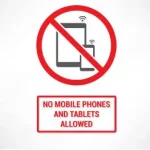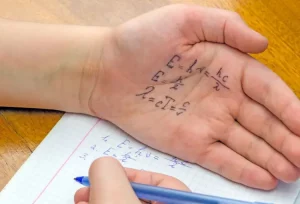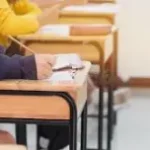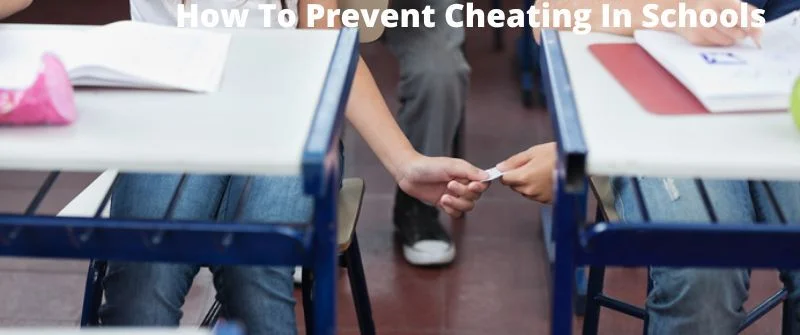Exam cheating in schools has become prevalent. Public and private schools have to find suitable means of preventing this academic fraudulence.
The introduction of online testing has made the situation worse. However, all hope is not lost. There are effective measures that can completely reduce this vice.
21 Ways to Prevent Cheating in Schools
1. Have Mandatory Clearing of the Desk
Before the exam test starts, the first step is to ensure that students clear their desks. This should happen in the presence of an invigilator. All items including exercise books and textbooks should be removed from the desks.
Invigilators should only allow items that are necessary for the testing. This includes pens, pencils, the test, test cover sheets, etc.
Keeping books around the desk provides an avenue for students to hide cheat sheets or any other material that will aid in cheating. Items that are not necessary for the exam should be out of reach for students.
2. Do not Allow Cellphones or Tablets
A serious examination environment should be devoid of cell phones, tablets, and other electronic gadgets. Phones are the perfect tools that students can use to search for answers using the internet.

The teacher should require these gadgets to be out of the students’ sight when the examination is taking place.
During examinations, there should be specific procedures for students to follow regarding phone use.
For instance, students can enjoy the freedom of placing their phones in a designated area for the period of the exams.
3. Walk Around the Classroom
As a teacher, being in one location when exams are going on is a mistake. Do not sit at your desk because it will not be possible to see all corners of the classroom.
Walking around the classroom gives you the best position to see all areas of the classroom. When you walk around the classroom, you can see students from different angles.
Another alternative strategy that can prevent cheating is standing at the podium or in a central place. In this way, a teacher can be able to take a good look and know what is happening.
Even if you do not catch the student cheating, this is a deterrent measure that prevents possible cheating attempts by students.
4. Talk about Honesty and Integrity
It is important to discuss honesty and integrity with your students. Instilling good values of being truthful can help to change the mind of a student who was intending to cheat.
As much as it may not prevent or deter cheating practices, reminding them about academic integrity is significant.
Also, remind the students about your expectations when it comes to academic honesty. This can make a student with bad intentions of cheating think twice. Small mistakes like incremental plagiarism should be avoided.
This kind of talk should be done shortly before the exams or a day before.
5. Remind Students of the Repercussions of Exam Cheating

A reminder of the consequences of cheating is a great preventive measure.
A day before the testing, a teacher should put more emphasis on the consequences of cheating if a student is get caught.
The thought of suspension, exam cancellation, retaking the test, or even expulsion from school can deter cheating.
It frightens a student who had intentions of engaging in exam malpractice.
6. Have Different Assessment Versions
Different versions of assessments can prevent cheating in tests. Create more than two versions of the same test. Also, ensure that the questions appear in a different order for each of the versions you have.
There are a lot of available options for twisting questions for both online assessments and paper tests. If possible, reword the questions and change the sequence.
Having different versions is a good way of detecting students who rely on their classmates’ answers. They are bound to have incorrect answers for the version they had.
Alternatively, a teacher can reveal the trick to the learners up front to discourage copying.
7. Students to Remain in their Seat
When assessments are in progress, students should not have permission to get out of their seats. As such, ensure that students visit the toilets before the exams start so that there is no excuse to leave their seats.
Otherwise, it will be easier for a student to pick up answers when they are moving around the classroom. Movement and communication when exams are ongoing should be prohibited to enhance exam credibility.
8. Create a Good Atmosphere for Asking Questions
In reality, prevention is better than cure. It is good to prevent students from cheating by helping them where they are struggling. Every student to know how to write without plagiarizing.
Some students struggle in exams but are afraid to ask for help. The strategy is to have a teaching style that encourages these students to ask questions or seek clarity.
Do not segregate them for their inability to understand a subject. In this way, students will be more comfortable when asking for help from their teacher because of the friendly environment.
They will improve their knowledge and be eager to succeed in exams.
9. Alter the Structure of Tests
The normal standard of exams has become monotonous. Adopting the format of multiple-choice questions for assessments is now too common.
This type of structure makes it easy for students to copy answers from others. In addition, this type of assessment only requires memorization of information.
A good option is to sharpen their thinking abilities and deviate from an open-ended system of assessments. In the end, it becomes difficult for a student to copy information from another source.
Instructors can easily see identical answers, especially from students who sat next to each other. It is a clear indication that there was cheating.
10. The use of Cover Sheets
This is a simple technique that can help to prevent students from copying from each other. A cover sheet is a blank sheet of paper that students will use to cover their answers when taking a test.
However, teachers should ensure that the cover is a blank sheet of paper that does not contain any form of writing. Clever students might take the opportunity to write vital information on the cover sheet.
11. Change Seating Arrangement on the Test Day
In a typical classroom setting, students who sit close to each other can plan to copy from each other. If a teacher detects this intention, the best solution is to alter the seating structure of the class.

This should be done on the test day by making students sit in different places than their usual ones.
It is the responsibility of the teacher to decide where each student will seat.
Ideally, students who have a tendency of copying should be seated far away from each other.
This is a good strategy that can help teachers curb avid exam cheaters.
12. Reduce Exams Anxiety
Students always feel anxious when exams approach. Apart from not knowing what to expect, there are also a lot of technology concerns.
This nervousness can make other students think of cheating as a good alternative. Therefore, a teacher should minimize anxiety by providing frequent tests.
This makes students be used to tests and take them as a normal routine.
13. Elaborate the Instructions
Some students may cheat because of not understanding test instructions. Invigilators should explain to students the resources that are allowable for access during the examination period. This should be done for both classroom and online exams.
For online exams, explain to students the websites that they can access, the scope of the content they expect, and the gadgets they can use. This makes students aware of what is permissible and what is not.
14. Use Browser Locks
With the increasing popularity of online proctored exams, detecting and preventing cheating is even more difficult. A browse1r lock can act as a good preventive measure.
Students will have restrictions to access other websites to get answers to questions. In the same way, the lock will disable keyboard functions and inactivate all shortcuts.
This will make the exam taker not find any options for cheating while taking online exams.
15. Identity Verification for all Exam Takers
In online exams, it is common for another person to take an exam on behalf of a student. In this case, verification of the student’s identity before the assessment begins is very important.

The use of a webcam can help to check if a different individual is in charge of a candidate’s exam.
With proper proctoring services, undertaking ID verification is very achievable.
A comparison of the exam taker’s ID card and the biometric profile can help to detect impersonation.
16. Create Questions that need High Reasoning
Obvious and simple questions make it very easy for students to find answers. If students only have to respond to simple queries, it becomes easy for them to search for answers online.
They can also effortlessly get the right answers from their textbooks. However, with complex questions on evaluation levels and analysis, students will have to think to find the right answers.
In the end, the measure enhances the creativity and ability of the students to think.
17. Computer Cameras Should be on
Although there are many ways students cheat online, if you ask all students to turn on their computer cameras during tests, you can immensely cut down the temptation of cheating.
Not only should they turn on their cameras, but also disable all chat functions. This means the students can only communicate with the instructor and not with each other.
At the same time, teachers can also use software to randomly check the activities on the students’ monitors.
18. Prevent Access to Test Materials
All test materials need to be secure before an assessment. For instance, all the copies you make and the original ones should be safe and accounted for.
Clever students can try to access test materials by bogus means such as breaking the office. Under the circumstances, a teacher should be careful with office and locker keys.
When school, lock all test materials in a secure file cabinet. Never assume that test materials you leave at school are safe. Lastly, do not leave your cabinet or office keys with any student irrespective of the trust level.
19. Provide all the Items that Students will Need
Allow students to use only materials from you. Students can easily write answers on the test materials they bring. To avoid this, announce to them in advance that you will provide all the test materials they will require.
Rulers, covers, and paper sheets can easily conceal answers. If you let students know that you will provide these materials, it will preve2nt them from trying to cheat.
20. Ask for Reinforcement
It is difficult to supervise a classroom that has many students.
If you are teaching a large class, it is advisable to ask other teaching assistances to reinforce you.
This will boost invigilation effectiveness and make it easy to spot suspicious activities.
It becomes possible to observe all sections of the examination room. Needless to say, do not leave the room during the test. If you should, let another assistant stand-in for you.
21. Let Students Walk up to your Location to Ask Questions
There will be times when students will have questions or seek interpretations. If a teacher walks to the student to clarify, the attention switches to that student.
If students were copying from others or cheating, it gives them a good opportunity. If a student walks up to you, you will offer help and still be able to check the rest of the class.
Conclusion
It is good for students to know what constitutes academic dishonesty. Some students practice cheating or plagiarism unknowingly. Rightly so, teachers need to clearly define what cheating is and elaborate to them all unacceptable behaviors. Have a clear elaboration of all the actions that are considered academic offenses.
Describe to them how they should take the assignment. Even more importantly, explain to them the significance of academic integrity. You can also remind them of the school policies regarding academic deceit.

Joseph is a freelance journalist and a part-time writer with a particular interest in the gig economy. He writes about schooling, college life, and changing trends in education. When not writing, Joseph is hiking or playing chess.
